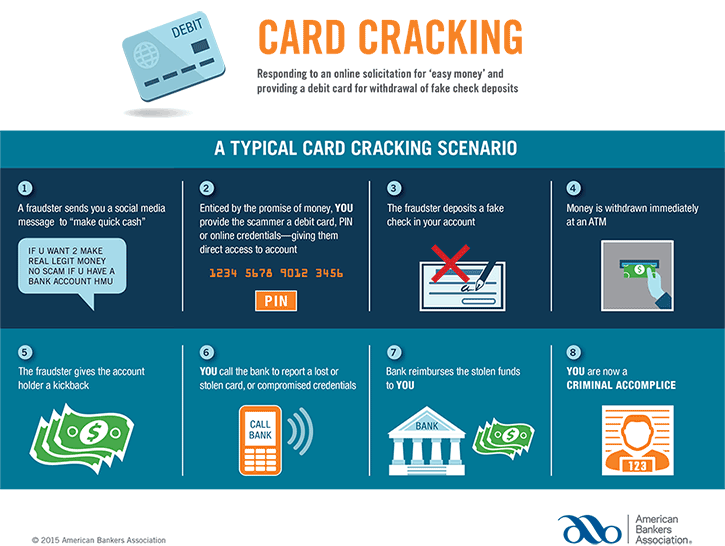ID Theft or Fraud
ID Theft or Fraud
WASHINGTON — Banks and law enforcement are cracking down on an emerging scam known as “card cracking.” card cracking is a form of fraud where consumers respond to an online solicitation for “easy money” and provide a debit card for withdrawal of fake check deposits.
According to a 2014 ABA survey, bank respondents reported $11.6 million in stolen funds as a result of card cracking.
Criminals use social media platforms like Facebook, Twitter, or Instagram to solicit consumers, often targeting people between the ages of 19 and 25 years-old, as well as college students, newly enlisted military and single parents.
Customers who respond to these solicitations, now accomplices, provide a debit card, PIN and online credentials to give the criminal direct access to their account. The fraudster deposits worthless checks using mobile deposit and immediately withdraws the funds at an ATM. The customer then calls to report a stolen card or compromised credentials. The bank reimburses the customer for funds lost and the criminal provides the customer with a cut of the money withdrawn using worthless checks.
Banks have developed an increasingly sophisticated system for detection. Fraudsters and consumers who are caught face a variety of consequences, including the loss of an account, the loss of money, damaged credit, and possible jail time.
To help consumers avoid involvement, ABA is offering the following tips:
- Do not respond to online solicitations for “easy money.” Card cracking advertisements will suggest that this is a quick, safe way to earn extra cash. Keep in mind that easy money is rarely legal money.
- Never share your account and PIN number. Keep this information private at all times. By sharing it with others, you expose yourself to potential fraud.
- Do not file false fraud claims with your bank. By filing a false claim, you are a co-conspirator to fraud. Banks’ detection techniques for card cracking are constantly improving and suspicious claims will be investigated.
- Report suspicious posts linked with scams. If you notice postings that appear to be linked with a possible scam, report them to the social media site. There is usually a dropdown menu near the post to allow for easy reporting.

